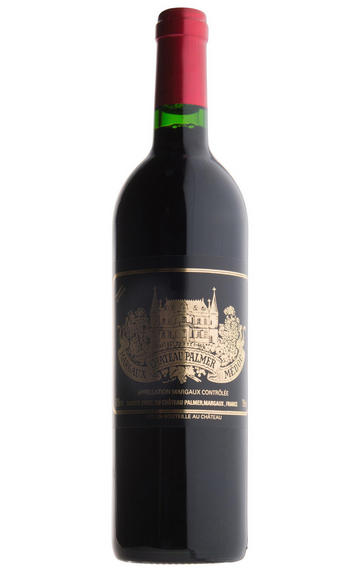
2021 Château Palmer, Margaux, Bordeaux
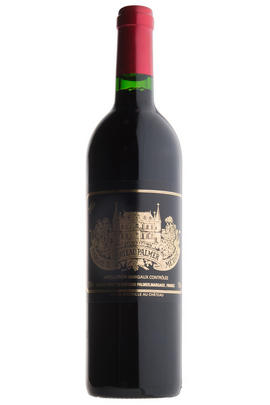
Critics reviews
The 2021 Palmer has a discrete bouquet that demands patience. This does not race out of the blocks, rather it unfurls with subtle graphite scents, blackberry, hints of cassis, plus some of the briny aromas that I noticed on the Alter Ego. The palate is medium-bodied with fine tannins that frame the cedar and graphite infused black fruit. Quite strict for a Palmer, yet fresh with a cerebral, saline finish that is almost Pauillac-like in style despite the majority from old Merlot vines that are situated on some of its finest gravel terroirs. Very long, very suave on the finish. Superb.
Drink 2030 - 2065
Neal Martin, vinous.com, (May 2022)
Palmer has a little more Merlot in the 1st wine blend than usual, something that is not the case for everyone this year, but reflects how unusual Palmer's Merlot on gravel really is. This is one that makes you sit up and take notice; with savoury fruits that have sinew and character, juicy raspberry, blueberry and black cherry, good persistency, helped by fresh acidities and slate texture. Clear ageing potential, acidity more present than in the past few years at Palmer, but the sense of energy and momentum is entirely in the spirit of the estate. 22hl/h yields (but 8ha were lost to frost, so the 'real' yield was 27hl/h). Harvest September 24 to October 16, with the majority in by October 11.
Drink 2028 - 2043
Jane Anson, janeanson.com (May 2022)
Less exuberance but Palmer identity intact, the old-vine Merlot to the fore. Dense and full with a generosity of fruit. Silky texture on attack, the tannins present but controlled. Slightly dry finish with a bit of chew. Should improve further with élevage.
Drink 2028 - 2046
James Lawther, jancisrobinson.com (May 2022)
The late-ripening, low-yielding vintage has delivered a beautifully balanced wine of striking intensity in the 2021 Palmer. Unwinding in the glass with complex aromas of blackberries, exotic spices, licorice, violets and burning embers, it's full-bodied, layered and enveloping, with a deep, concentrated core of fruit, ripe tannins and lively acids, concluding with a long, expansive finish. If recent vintages of Palmer have set new records in their power and richness, the 2021 marks a return to the classical proportions of the 1990s—with all the additional concentration and precision that Thomas Douroux's pioneering viticulture and thoughtful winemaking have brought to the equation at this address in the interim. The grand vin is a blend of 56% Merlot, 41% Cabernet Sauvignon and 3% Petit Verdot, picked between September 24 and October 15. Tasted twice.
William Kelley, Wine Advocate (Apr 2022)
About this WINE
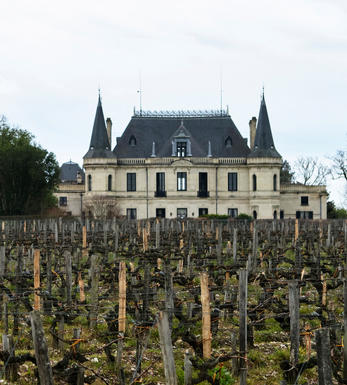
Château Palmer
Château Palmer is a leading wine estate in Margaux. Within its appellation, Palmer is certainly the closest rival to its first growth neighbor, Ch. Margaux. Although officially ranked a Third Growth, at their best, the wines of Ch. Palmer are among the greatest anywhere in Bordeaux.
The estate dates to the 17th century, though it was not until 1814 that Englishman Charles Palmer took ownership and gave it his name. In 1938, the estate was bought by four Bordeaux négociant families, two of whom – Sichel and Mähler-Besse – still own the property today. Since 2004, the estate has been led by the charismatic agronomist and oenologist Thomas Duroux, who had previously made wine at Ornellaia in Tuscany.
Thomas undertook major renovations, including completely modernizing the grape reception area, the vat rooms, and barrel cellar. In the vineyards, the technical team began experimenting with biodynamic farming, and today Palmer is among the leading biodynamic vineyards in Bordeaux. In addition to the grand vin, the Ch. Palmer’s portfolio also includes a cuvée called Alter Ego.
Introduced in 1998, Alter Ego is produced from grapes grown on dedicated plots and blended differently from the grand vin. As such, the estate regards it not as a second wine but as a distinctive cuvée in its own right.
Palmer lies in the commune of Cantenac, just outside the village of Margaux. 66 hectares of vines are planted on a plateau of gravel, sand, and clay soils overlooking the Gironde estuary. Plantings include equal parts of Merlot and Cabernet Sauvignon at 47% each and 6% Petit Verdot. Although the average age of the vines is fairly typical of the region at about 40 years, some of the vines are over 70 years old. That, along with the relatively high Merlot content and the benefits of careful, well-established biodynamic practices, may account for the wines’ richness and complexity.
Fermentation occurs in conical, stainless-steel vats in varying sizes, allowing each variety and parcel to be fermented separately for subsequent selection and blending. The grand vin is aged for 20-22 months in barrels, of which less than 50% is new. Thanks to the health and consistency of the estate’s biodynamically produced fruit, Palmer has been able, over the past few years, to safely reduce the quantity of sulfites added throughout the process, aiming to produce wines with more freshness and purity of flavor. For Alter Ego, less new wood is used, and aging time is slightly reduced to produce a wine the estate describes as “distinguished by its freshness of fruit, crisp intensity, and richness from the moment out of the barrel”.
Between 2008 and 2013, Ch. Palmer made the transition to 100% biodynamic farming. In addition to its vineyards, the estate is home to a diversity of complementary plants and grazing animals.
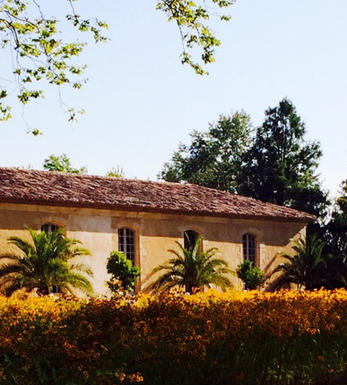
Margaux
If Pauillac can be seen as the bastion of ‘traditional’ Red Bordeaux, then Margaux represents its other facet in producing wines that are among Bordeaux’s most sensual and alluring. It is the largest commune in the Médoc, encompassing the communes of Cantenac, Soussans, Arsac and Labaude, in addition to Margaux itself. Located in the centre of the Haut-Médoc, Margaux is the closest of the important communes to the city of Bordeaux.
The soils in Margaux are the lightest and most gravelly of the Médoc, with some also containing a high percentage of sand. Vineyards located in Cantenac and Margaux make up the core of the appelation with the best vineyard sites being located on well-drained slopes, whose lighter soils give Margaux its deft touch and silky perfumes. Further away from the water, there is a greater clay content and the wines are less dramatically perfumed.
Margaux is the most diffuse of all the Médoc appelations with a reputation for scaling the heights with irreproachable wines such as Ch. Margaux and Ch. Palmer, but also plumbing the depths, with too many other châteaux not fulfilling their potential. There has been an upward shift in recent years, but the appellation cannot yet boast the reliability of St Julien. However, the finest Margaux are exquisitely perfumed and models of refinement and subtlety which have few parallels in Bordeaux.
Recommended Châteaux: Ch. Margaux, Ch. Palmer, Ch. Brane-Cantenac, Ch. Rauzan-Ségla , Ch. Dufort-Vivens, Ch. Ferrière, Ch. du Tertre, Ch. Giscours, Ch. d'Angludet.
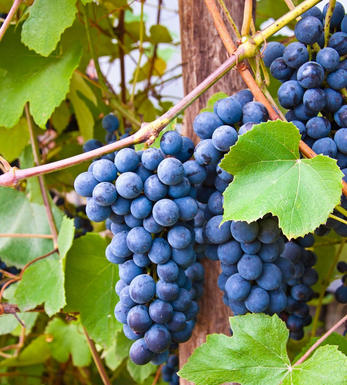
Merlot/Cabernet Franc
Merlot and Cabernet Franc are grape varieties commonly used in Bordeaux-style blends, particularly in the Bordeaux region of France. When these two grapes are blended, they can create a wine that combines the best characteristics of each variety.
Merlot is known for its smoothness, soft tannins, and ripe fruit flavours. It often contributes black cherry, plum, and chocolate flavours to the blend. The grapes are relatively easy to grow and ripen earlier than other Bordeaux varieties, making them versatile for blending.
Cabernet Franc, on the other hand, adds structure, depth, and complexity to the blend. It typically brings aromas of red fruits such as raspberry and strawberry, along with herbal notes like bell pepper and tobacco. These grapes have thinner skins and can be more challenging to cultivate, requiring specific growing conditions to reach their full potential.
When Merlot and Cabernet Franc are combined, the result is a well-balanced wine with various flavours and aromas. The blend often exhibits a Bordeaux wine's medium to full body, along with a smooth texture and moderate tannins. The specific flavour profile can vary depending on the proportions of each grape in the blend and the terroir and winemaking techniques employed.


Buying options
Add to wishlist
Description
Merlot 56%, Cabernet Sauvignon 41%, Petit Verdot 3%
Palmer brings a truly great wine to the table this year. The blend has some more Merlot than usual; thanks to the unique gravel soils here, mildew was less of an issue than elsewhere in Bordeaux. The nose offers soft dark-fruit aromas with hints of graphite, sweet spices and violets. The delicacy of the nose is set against an intriguingly complex palate, owing no doubt in part to their low-yielding old vines (22 hl/ha this year). Layers of ripe blackberries, blueberries and damsons vie with vibrant red cherries and raspberries. Undertones of tar, black pepper and a mouth-watering burst of salinity emerge on the finish. The tannins are sumptuous and silky; the finish goes on and on. Drink 2028-2050.
Our score: 18.5/20
Berry Bros. & Rudd, April 2022
wine at a glance
Delivery and quality guarantee